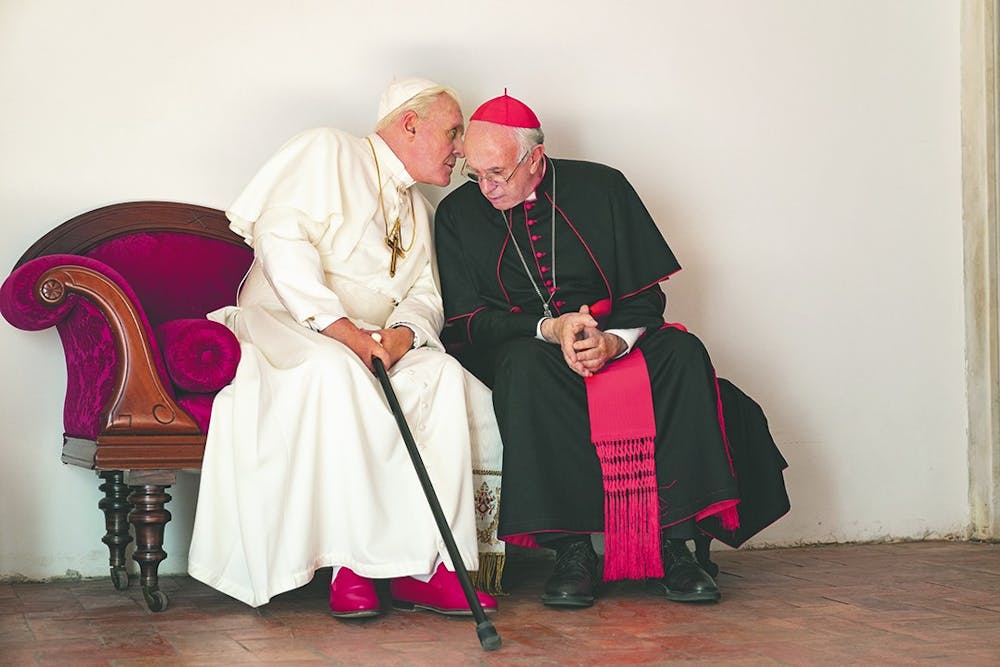Movie: The Two Popes
Release Date: Dec. 20, 2019
Director: Fernando Meirelles
Runtime: 2 hours 5 minutes
Genre: Biography
Rating: A
The role of pope is one of great esteem in the Catholic faith, and it should not be taken lightly by those selected to fulfill the duties. This is perhaps one of the central themes in “The Two Popes,” Fernando Meirelles’ Netflix film. “The Two Popes” demonstrates the importance in selecting the right person for such a demanding position and gives audiences a look into the complex relationship between Pope Benedict XVI, played by Anthony Hopkins, and Cardinal Jorge Bergoglio — better known as Pope Francis — played by Jonathan Pryce.
The film follows the story of Pope Benedict XVI’s self-pronounced inability to meet the evolving needs of the Catholic church and Cardinal Bergoglio’s resistance to assume the role at Benedict’s request. Audiences are given a look into their histories, their faith and their differences, but ultimately, “The Two Popes” is a biographical drama that tells a story of overcoming differences and accepting forgiveness for the sake of a shared cause.
“The Two Popes” succeeds in crafting a multifaceted story that appeals to emotions and begs audiences to search for the meaning or “moral of the story.” The movie is unusual in that it almost blurs the line between drama and documentary. If one was unfamiliar with the actors, the film would likely be hard to distinguish from a documentary. The somewhat shaky filming technique combined with an authentic script and raw yet realistic acting are enough to emulate a documentary, but the integration of news clips and footage of the characters in real life make it difficult to differentiate between genres.
“The Two Popes” stays true to its title for nearly the entirety of the film. There are only two developed characters throughout the movie: Pope Benedict XVI and Cardinal Bergoglio, who later becomes Pope Francis. The narrow focus on two characters allows the story to be portrayed in the most alluring way possible, and the relationship between Bergoglio and Benedict lets audiences compare and contrast the two, which, as one sees by the end of the film, is important to the central message.
The character foil between the two, along with the evolution of their ability to understand and accept each others’ differences, takes center stage in this movie while simultaneously bringing the necessary dose of comedy to balance the seriousness of topics such as faith and responsibility. Some differences are little — Bergoglio likes The Beatles while Benedict prefers classical music — and some are large, such as their conflicting opinions about sexual orientation. In the beginning, their inability to overlook theses differences are clear, and their relationship is one of disagreements. As they begin to open up to one another about their past experiences, audiences witness an evolution that culminates with Benedict’s renouncement of the papacy and his request that Bergoglio take over.
The film comes during an interesting time for Catholicism, but it is clear that a shared love of their faith and the desire to better serve their people is what motivates Bergoglio and Benedict to overcome their differences. In a time when stark differences in beliefs are sometimes difficult to ignore, the lessons the two teach each other about forgiveness, balance and finding common ground are lessons that audiences can take with them too.

